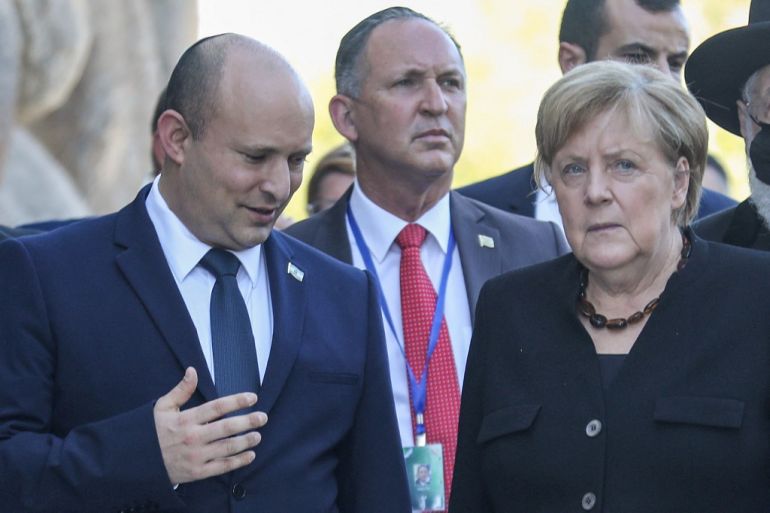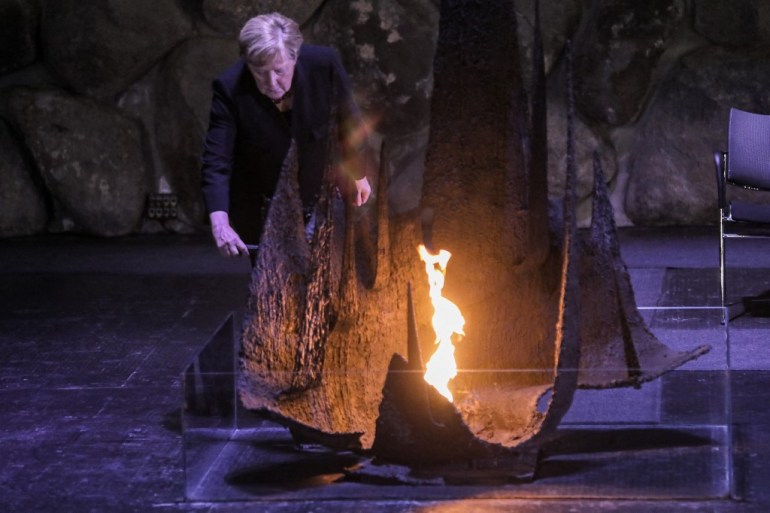Germany’s Merkel, Israel’s PM Bennett differ on Iran, Palestine
Merkel says Berlin remains committed to reviving the international nuclear deal with Iran as well as a two-state solution in Palestine.

Germany’s outgoing chancellor, Angela Merkel, paid a final official visit to Israel amid differences between the allies on the key issues of Iran’s nuclear programme and the establishment of a Palestinian state.
Merkel said on Sunday that Germany remains committed to reviving the international nuclear agreement with Iran – a step Israel vehemently opposes.
Keep reading
list of 4 itemsA vote for ‘stability’: World reacts to Germany election outcome
Germany elections: What happened, and what happens next?
Germany’s centre-left secures narrow win in end-of-era election
She also said Germany believes a two-state solution remains the best way to end Israel’s decades-long conflict with the Palestinians.
“I think that on this point, even if at this stage it seems almost hopeless, the idea of a two-state solution should not be taken off the table, it should not be buried … and that the Palestinians should be able to live securely in a state,” Merkel said at a joint news conference with Prime Minister Naftali Bennett.
She also said Israeli settlement construction on occupied territories sought by the Palestinians was unhelpful.
Bennett, a former settler leader who opposes the establishment of a Palestinian state, quickly pushed back.
“Based on our experience, the meaning of a Palestinian state means that very likely there will be established a terror state, roughly seven minutes from my house and from almost any point in Israel,” he said.
Calling himself a “pragmatic man”, he instead said he was prepared to take steps on the ground to improve living conditions for Palestinians in the West Bank and Gaza Strip.
‘Terrorism is the occupation’
Hussein al-Sheikh, a senior Palestinian official, who oversees relations with Israel, responded angrily. “The worst form of ‘terrorism’ is the occupation, not the establishment of a Palestinian state,” he wrote on Twitter.
It was one of the few disagreements between the close allies during Merkel’s two-day visit, which caps a 16-year term marked by near unwavering support for Israel.
Omar Shakir, Israel and Palestine director at Human Rights Watch, criticised Merkel for regarding Israel’s 54-year occupation as “temporary”.
“Maintaining this fiction has allowed the Merkel government to avoid dealing with the reality of apartheid and persecution of millions of Palestinians,” he said in a statement.
During her leadership, Merkel repeatedly professed Germany’s commitment to Israel’s security and said she was confident that Germany’s next government – to be determined in lengthy coalition talks following an inconclusive election last month – would take a similar stance.
“I am optimistic that every German government, including the one that follows mine, will feel committed to Israel’s security, and I think any successor who becomes German chancellor will see it that way,” she said.

Merkel backs nuclear deal
Much of the agenda was expected to focus on Iran’s nuclear programme. While the two leaders both promised to prevent Iran from developing a nuclear weapon, they voiced different approaches on how to do that.
Germany was a leading player in the 2015 international nuclear deal with Iran. The accord fell apart after then-President Donald Trump, with Israel’s support, withdrew from the agreement in 2018. The Biden administration has been trying to revive that deal – known as the JCPOA – over Israeli objections.
“I never considered the JCPOA to be ideal, but it’s better than having no agreement,” Merkel said. She said the situation is “very difficult” as Iran continues to enrich uranium. “We are facing critical weeks around this question,” she said.
Israel considers Iran its greatest enemy, citing the country’s military presence in neighbouring Syria and its support for hostile fighter groups across the region. It accuses Iran of trying to develop nuclear weapons – a charge Iran denies – and says a nuclear-armed Iran would pose an existential threat to Israel.
“There is no point in trying to appease the Iranians. They interpret conciliation as a weakness,” Bennett said, accusing Iran of trying to delay while it moves forward with its weapons efforts. ”This is a critical point in time, and Germany’s position is particularly important.”
Merkel also made a stop at Israel’s national Holocaust memorial, Yad Vashem, where she laid a wreath in memory of the six million European Jews killed by the Nazis during World War II.
“After the crimes against humanity of the Shoah [Holocaust], it has been possible to reset and to re-establish relations,” Merkel said.
It was “moving” that Israel had come to trust post-war Germany, but this “trust always has to prove itself”, she added.